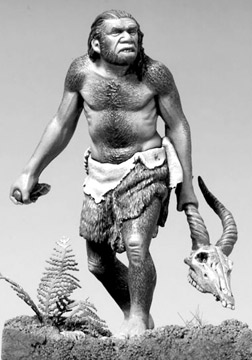There's a Neanderthal in all of us - DNA study
Only 10 years after scientists triumphantly decoded the human genome,
an international research team has mapped the genes of the long-extinct
Neanderthal people and report there's a little bit of Neanderthal in all
of us.
 The remarkable finding could answer a question that has been hotly
debated among anthropologists for decades: whether our human ancestors
and the Neanderthals interbred some time after both species left Africa
many thousands of years ago. The remarkable finding could answer a question that has been hotly
debated among anthropologists for decades: whether our human ancestors
and the Neanderthals interbred some time after both species left Africa
many thousands of years ago.
The report, published in the journal Science, capped more than five
years of intensive work by a group of 56 international scientists led by
German paleogeneticist Svante Pääbo and Richard E. Green of UC Santa
Cruz.
Edward M. "Eddy" Rubin, director of the Department of Energy's Joint
Genome Institute in Walnut Creek, called the major project "a terrific
piece of work and a monumental endeavour."
The project's scientists used tiny specks of powdered bone retrieved
from three Neanderthal females who died in a Croatian cave more than
40,000 years ago to complete the draft of the Neanderthal genome. They
then compared the genes to those of modern humans living today in five
different regions of the world: France, Papua New Guinea, China, and
southern and northern Africa.
Among their conclusions:
* Humans living today carry between one and four percent of
Neanderthal genes that carry the code for proteins in our bodies.
* Those genes must have entered our lineage sometime during a
50,000-year period when the Neanderthals and humans left Africa through
the Middle East and spread throughout Europe and Asia. The Neanderthals
became extinct about 30,000 years ago.
* The complete genomes of the Neanderthals and modern humans, whose
lineages separated from some unknown common ancestor at least 400,000
years ago, are 99.5 percent identical. They are, in fact, our closest
evolutionary relatives. By comparison, humans and chimpanzees share 98
percent of their genes.
The scientists analyzed four billion units of Neanderthal DNA, called
nucleotides - at least 60 percent of the Neanderthal's entire genome.
While incomplete, Pääbo told reporters during a teleconference that 60
percent "is a very good statistical sample of the entire genome."
Finding the Neanderthal genes in people living today provides
"compelling" evidence that thousands of years ago some interbreeding
occurred between the two species, Green said.
"The sequencing of Neanderthal genetic material is real gold because
we can now compare the Neanderthal genome with our own and pinpoint the
genetic changes that have enabled humans to thrive, to spread across the
entire globe, and to occupy every ecological niche that exists in the
world," he said .
Green's group reported finding at least five genes in modern humans
where natural selection apparently gave humans an evolutionary advantage
over the Neanderthals. They include genes involved in mental
development, in converting food into energy, and in developing the
skull, the rib cage, and other parts of the human skeleton.
In some of those genes lie many of the reasons the Neanderthals
appear so different from humans despite the similarity of our genomes.
Archaeologists have described them as short, beetle-browed, powerfully
built, with no chin and large noses. Yet they made sophisticated stone
tools and used animal skins for clothing.
- San Francisco Chronicle
|

